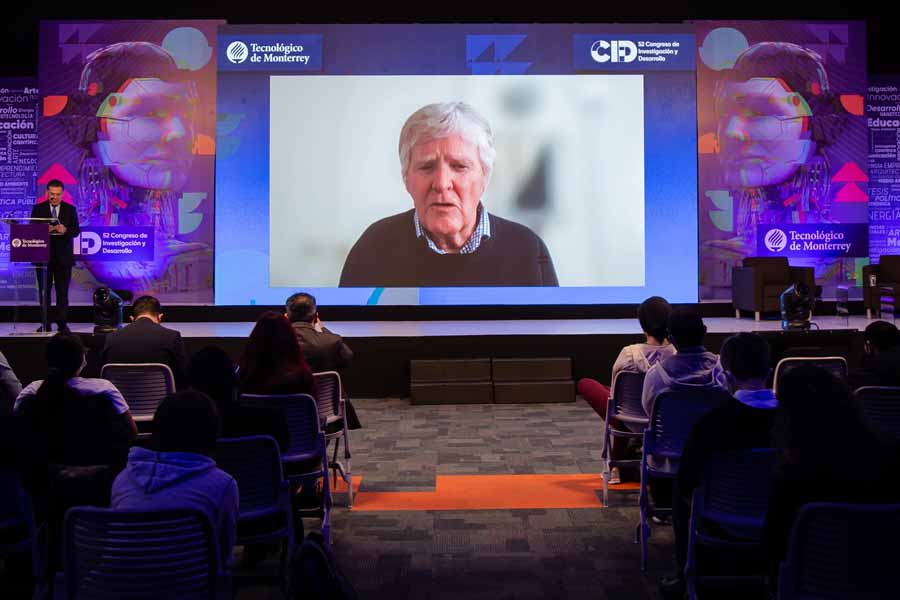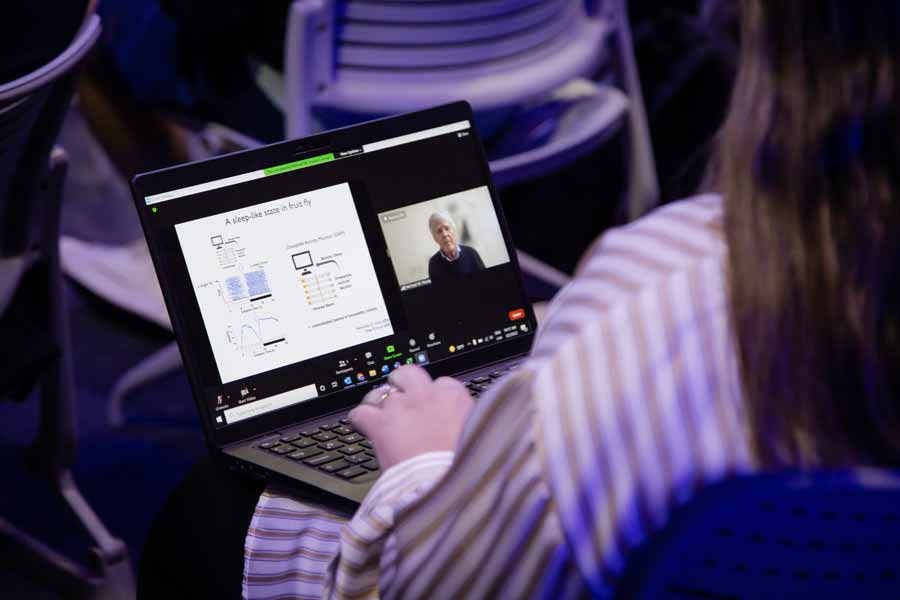Extreme social isolation alters the quality and quantity of sleep, said Michael W. Young, winner of the 2017 Nobel Prize in Medicine, during Tec de Monterrey’s 52nd Research and Development Conference (CID).
Young discussed the consequences of extreme isolation on fruit flies and how these can be model organisms for understanding human nature.
The scientist has carried out experiments on flies to observe how circadian rhythms (or internal biological clocks) alter an individual’s metabolic processes.
Young cited a report from the American Psychological Association showing that 6 out of 10 adults in the United States admitted they had been sleeping more or less than they wanted to since the start of the pandemic. Undesired weight changes and increased alcohol consumption were also reported.

The consequences of pandemic-related stress
During his talk, “Chronic Social Isolation Signals Starvation in the Drosophila Brain and Reduces Sleep,” Young used this study as an example of metabolic alterations in people as a consequence of external changes and the side effects on health.
“The more experiments we carry out, the more convinced we are that there’s a relationship between sleep patterns and alterations in metabolic activity under isolated conditions,” he said.
These studies correlate with experiments conducted on flies. When they were placed in extreme isolation, they slept much less and ate more, said Young, who is also Vice-President for Academic Affairs at The Rockefeller University.
The American Psychological Association reported that the majority of respondents (61%) had experienced undesired weight changes, with 42% saying they gained more weight and 18% saying they lost weight. Similarly, 23% reported drinking more alcohol.
“There’s a relationship between sleep pattern and alterations in metabolic activity under isolated conditions.”
Flies and their behavior patterns
Young studied the behavior of flies under conditions of extreme isolation, a contribution that sheds light on human behavior during the pandemic.
Fruit flies (Drosophila) have sleep cycles similar to those of humans, which is why they’re used as model organisms to understand the molecular mechanisms controlling the circadian rhythm.
This is an internal body clock that depends on gene expression.
At first, they didn’t show any major differences during periods of 1 to 3 days of isolation, but there was a significant reduction and disruption of sleep from day 5 to day 7.
“The longer the fly is isolated, the greater the impact. Its sleep was reduced by up to 40%.”
Meanwhile, flies that had been placed in containers where there was social interaction, in groups from 2 and 100, showed no effects.
Changes to the fly’s environment
The research group wondered if these disruptions would persist if the flies in extreme isolation were kept separate in a tube opposite another group of 25 flies. They watched for any type of chemical communication from the flies seeing or smelling their neighbors.
“That seemed to make the isolated fly even more depressed than when totally alone. It didn’t just suffer from being lonely, but from feeling socially excluded,” Young said.
Alterations were tested on isolated flies that were only kept separate from other species, such as ants or ladybirds, and the results were the same: isolation disturbed their sleep and depressed them.

Less sleep, more food intake
Isolated flies increased their food consumption, eating more than twice as much as the flies living in groups with others, which can bring about significant metabolic changes.
They observed that if the P2 neurons of chronically isolated flies were shut down, it led to overeating.
Another test was whether changes in temperature would alter sleep patterns.
“If we incubate a group of flies at 22 degrees, there’s no difference in response to sleep. If those same flies are exposed to 28 degrees, we see a dramatic drop in sleep,” said the expert.
“We registered the same response in food intake at 22 degrees, but if we increase it to 28 degrees, we see a dramatic reduction in intake.”
This behavior in the animals could be a warning of what might happen.
Young suggested we can use these experiments on model organisms to find out which polymorphisms impacting sleep disorders in flies are present in humans.
The 52nd Research and Development Conference.
The Research and Development Conference has been held annually since 1971. Now in its 52nd year, it will be held from March 2 to 4, 2022, at the Monterrey campus Conference Center.
“For Tec de Monterrey, it’s crucial to continue developing a culture of research and innovation,” said Neil Hernández Gress, Associate Vice-Rector for Research and Technology Transfer at the Tec.
“To that effect, platforms, spaces, and activities have been designed with the purpose of involving, sharing, and communicating scientific and technological research, such as the Research and Development Conference,” he added.
ALSO READ:





